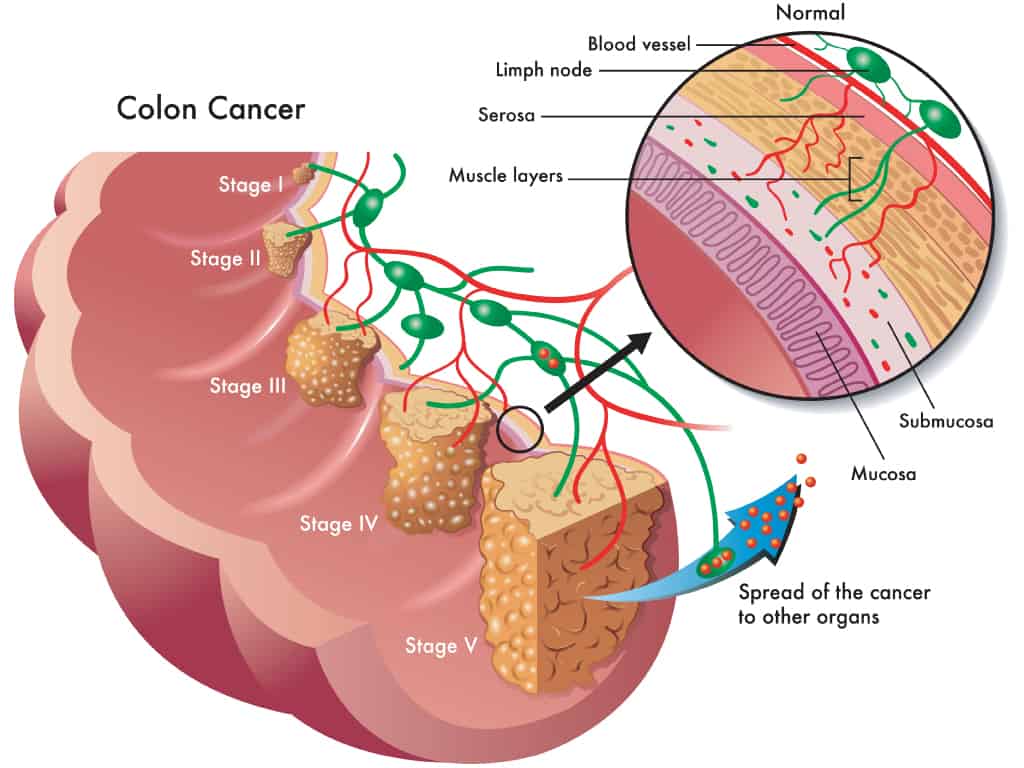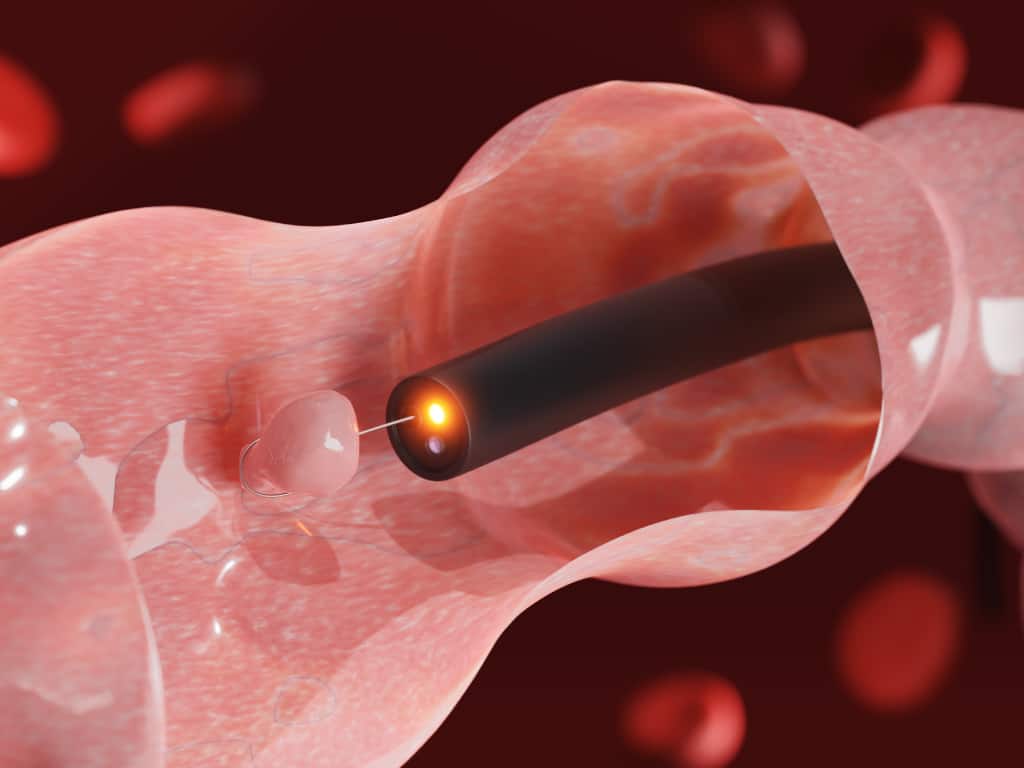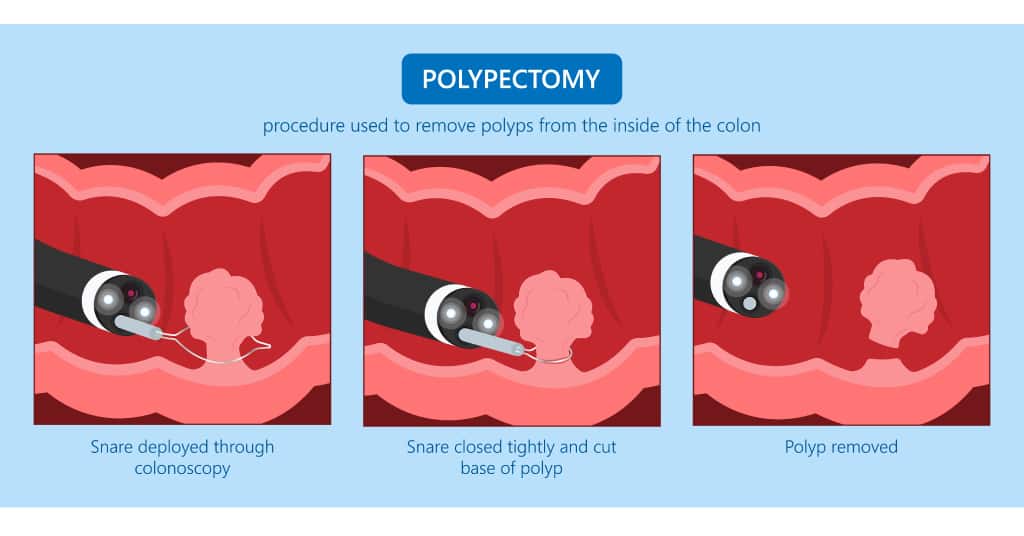What is Colorectal Cancer?

Colorectal cancer, as the term suggests, is a cancer that originates from the colon (large bowel or intestine) or rectum (the passageway that connects the colon to the anus). Depending on the location where the cancer has started, the condition may be referred to as colon or rectal cancer. Colorectal cancers typically start as a growth, or polyp, found on the inner lining of the colon or rectum. If this growth becomes cancerous, it will grow into the wall of the colon or rectum over time. It may also spread to other areas of the body in a process known as metastasis.
Colorectal cancer is Singapore’s top cause of cancer death, affecting over 1,865 cases a year. Thankfully, it is highly preventable with the help of regular screening through colonoscopy.
Additionally, colorectal cancer in Singapore is the most common cancer affecting males and the second most common cancer affecting women. Dr Benjamin Yip reminds us that “If you are 50 and above (or younger if you have other risk factors), it is important to discuss regular screening with your Gastroenterologist today. It might just save your life!”
Symptoms of Colorectal Cancer
While colorectal cancer does not typically cause any symptoms in its initial stages, there are some signs and symptoms to look out for, and they include the following:
- Persistent abnormal bowel habits
- Feeling like your bowels do not empty completely
- Rectal bleeding
- Blood in the stool
- Anaemia
- Abdominal pain
- Weakness
- Fatigue
- Unexplained weight loss
Please consult your gastroenterologist if you experience any of the aforementioned symptoms.
Risk Factors for Colorectal Cancer
The most common risk factors for developing colorectal cancer include the following:
- Obesity
- Physical inactivity
- Dietary habits
- Smoking
- Excessive consumption of alcohol
- Age (50 years and above)
- History of colorectal polyps
- History of inflammatory bowel disease
- Family history of colorectal cancer
- Diabetes
Colorectal Cancer Screening
Colorectal cancer screening is an important aspect of routine health care and will play an important role in preventing colorectal cancer and detecting it early. In Singapore, it is recommended that individuals above the age of 50 undergo a colonoscopy. Individuals with a family history or symptoms of colorectal cancer in Singapore are also advised to start screening earlier.
Other colorectal screening tests in Singapore include computed tomography (CT or CAT) colonography. sigmoidoscopy, stool DNA test, faecal occult blood test (FOBT) and faecal immunochemical test (FIT).
How is Colorectal Cancer diagnosed?

Colorectal cancer may be diagnosed in a number of ways, including the following:
Physical Examination
Your abdomen will be palpated to check for any masses or organ enlargement. Your doctor may also perform a digital rectal exam (DRE), where a finger is inserted into the rectum to check for any abnormal masses, or a proctoscopy, where a proctoscope is inserted in the anus and rectum to check for any abnormalities.
Laboratory Tests
You may be required to submit a stool sample to check for the presence of blood in your stool. There are also certain blood tests that your doctor may choose to order, including tumour marker tests. The most common tumour marker for colorectal cancer is carcinoembryonic antigen (CEA).
Diagnostic Colonoscopy
During a colonoscopy, a thin, flexible tube with a camera on one end – known as a colonoscope – is inserted into the rectum and colon through the anus. This will allow your Gastroenterologist to assess the entire length of the colon and rectum for any abnormal growths.
Diagnostic Imaging Tests
Ultrasounds, X-rays, CT scans, or MRI scans may be used to further examine any growths that have been found in prior tests.
Biopsy
If any suspicious growths are found during a colonoscopy, your Gastroenterologist will remove a small piece of tissue from the growth. This sample will be sent to the laboratory for further testing.
Can Colorectal Cancer be cured?
Early-stage, localised colorectal cancer can generally be cured by removing any cancerous growths in the colon or rectum. However, if the cancer has metastasised and spread to the liver, lungs or other organs, it will be more difficult to treat and may require more than one form of treatment or an extended treatment period.
Typically, a person’s prognosis will depend on the stage of the cancer, as well as how well each individual responds to various types of treatment.
What are the treatments for Colorectal Cancer?

There are several colorectal cancer treatment strategies and the surgical techniques include the following:
- Polypectomy
This refers to the surgical removal of polyps during a colonoscopy. This procedure may be beneficial in the prevention of certain cases of early-stage colorectal cancer.
- Transanal Excision
During a transanal excision, part of the rectal wall is removed. It can be effective in removing early-stage rectal cancers located near the anus while keeping the sphincter and anus intact.
- Transanal Endoscopic Microsurgery (TEM)
This procedure is similar to a transanal excision but makes use of an endoscope to reach growths that are higher up in the rectum without the need for any incisions.
- Low Anterior Resection
During a low anterior resection, part of the upper rectum is removed. Following this procedure, the colon will be reattached to the remaining part of the rectum. This procedure is most commonly used in the treatment of Stage 2 and 3 rectal cancers, but some Gastroenterologists may use it to treat some Stage 1 tumours as well.
- Proctectomy
This refers to the total surgical removal of all or part of the rectum and is commonly used to treat rectal cancer. After a proctectomy, the colon is connected to the anus in a procedure known as colo-anal anastomosis.
- Colectomy
During a colectomy, all or part of the colon is removed. Also known as colon resection surgery, this may be done through open surgery involving an incision in the abdomen or with the use of a laparoscope.
- Colostomy
Some patients may require a colostomy after surgery. During this procedure, the colon is cut and sutured to an opening in the skin of the abdomen – also known as a stoma. Colostomies are used to relieve any blockage in the colon and may be temporary or permanent.
Radiation Therapy
Radiation therapy makes use of high-energy rays to destroy cancer cells. It is more commonly used in cases of rectal cancer than colon cancer and is often used in conjunction with surgical treatment or chemotherapy. Radiation therapy can come in two forms: external-beam radiation therapy and internal radiation therapy.
Ablation and Embolisation
Ablation and embolisation may be used to treat colorectal cancer that has metastasised, most often to the liver or lungs.
Ablation is a technique that can be used to destroy small tumours which are less than 4cm in diameter. There are several types of ablation methods available:
- Radiofrequency ablation — This uses high-energy radio waves to destroy cancer cells.
- Microwave ablation — This makes use of electromagnetic microwaves to kill cancer cells in the liver.
- Ethanol ablation — To damage cancer cells, alcohol can also be directly injected into tumours.
- Cryoablation — In cryoablation, a thin metal probe is used to freeze tumours and kill cancer cells.
Embolisation is used in cases of liver tumours, and comprise the following three forms:
- Arterial embolisation — In this procedure, small particles are injected into the hepatic artery to reduce blood flow to any tumours in the liver. This helps shrink the tumour as a result of oxygen deprivation.
- Chemoembolisation — Combining both chemotherapy and arterial embolisation, chemoembolisation involves the administration of chemotherapy to the hepatic artery through a catheter. The artery is then blocked to treat the tumour.
- Radioembolisation — During radioembolisation, microspheres (tiny particles) coated with a radioactive substance are injected into the hepatic artery to deliver radiation to block the blood flow to cancer cells, ultimately killing them and shrinking the liver tumour. The radiation in the particles will gradually dissipate and any remaining particles will cause no harm to the body.
Systemic treatment options, such as chemotherapy, immunotherapy, and targeted therapy, may also be used in certain cases of colorectal cancer in Singapore.
Summary
Colorectal cancer is a common type of cancer that is easily treated when detected early. Unfortunately, if not detected early, it can metastasise to other parts of the body, making it difficult to treat. Therefore, regular screening is recommended, especially if you have any risk factors and are susceptible to develop colorectal cancer.
A healthy lifestyle can also help to prevent colorectal cancer, as well as other diseases. You can reduce your risk of developing colorectal cancer by adopting the following healthy practices:
- Consuming a fibre- and antioxidant-rich diet
- Keeping physically active
- Maintaining a healthy weight
- Reducing alcohol consumption
- Quitting smoking
Visit Alpha Digestive & Liver Centre
If you are 50 and above or have a family history of colorectal cancer, you can book a screening appointment with our Gastroenterologist Dr Benjamin Yip.
References
- Singapore Cancer Society, https://www.singaporecancersociety.org.sg/learn-about-cancer/types-of-cancer/colorectal-cancer.html. Accessed 14 October 2022.
- “Colorectal Cancer - Colorectal Cancer – Symptoms, Treatments.” SingHealth, https://www.singhealth.com.sg/patient-care/conditions-treatments/colorectal-colon-cancer. Accessed 14 October 2022.
- “Colorectal Cancer - NCIS.” National University Cancer Institute, Singapore, https://www.ncis.com.sg/Cancer-Information/About-Cancer/Pages/Colorectal-Cancer.aspx. Accessed 14 October 2022.
- “Polypectomy: Definition, Preparation, Procedure & Recovery.” Cleveland Clinic, 8 July 2022, https://my.clevelandclinic.org/health/treatments/23479-polypectomy. Accessed 14 October 2022.
- “What Is Colorectal Cancer? | Colorectal Cancer Research & Statistics.” American Cancer Society, https://www.cancer.org/cancer/colon-rectal-cancer/about.html. Accessed 14 October 2022.
- Mayo Clinic, “Colon Cancer” https://www.mayoclinic.org/diseases-conditions/colon-cancer/symptoms-causes/syc-20353669 Accessed 20 December 2023
- Cleveland Clinic, “Colorectal (colon) cancer”.https://my.clevelandclinic.org/health/diseases/14501-colorectal-colon-cancer Accessed 20 December 2023

